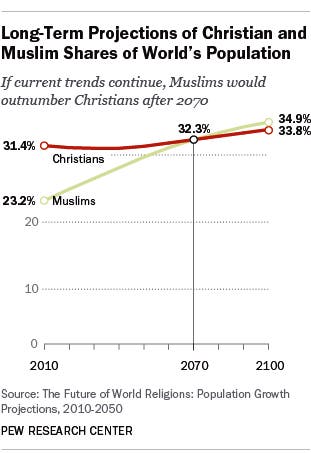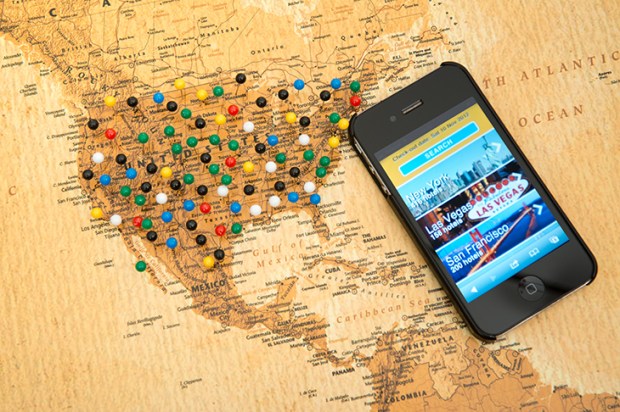These days, on the subject of Islam, non-Muslims have mostly divided into two camps — though there’s a little wandering about between the tents. Camp one says Islam is a religion of peace, and points for proof to the millions of non-violent Muslims around the world. Warlike Muslims are an anomaly, they say, and fight not because they are religious but because they are politicised. Bad guys like Isis aren’t Muslims so much as Islamists, which is different. Most politicians and public figures belong to this camp, including the Archbishop of Canterbury.
Camp two is more furtive. Members look around before they speak. In this gang, sotto voce, everyone agrees there is something intrinsically violent about Islam and that Islamism — Isis, for example — is a natural offshoot of its angry soul. The Queen’s chaplain appears to be in camp two. He sent a wave of revulsion through the media last month when he suggested the Quran might incite violence. Round here they say ‘Islam was spread by the sword’, meaning that conquest is in its DNA. Though Allah has a compassionate face, war is in his nature too. Ploughshares must sometimes become swords. How else will the caliphate be established?
On Easter Saturday, when England was flat with rain, I tried to decide which side to join and instead found myself in a third position, one which I think might make a reasonable refuge for confused clergy. My worry about Islam, as a religion but also as a growing influence on our culture, isn’t that it’s violent but that it doesn’t believe in original sin.
Now I can see that this isn’t going to be a popular camp. Most sensible types revolt at the thought of original sin. It’s medieval. It conjures in the public mind a picture of some spittle-flecked pervert in a dog collar making children cry. The idea that Adam and Eve screwed up so badly that their descendants are all fatally flawed seems both unpleasant and unfair. In Islam’s creation story, Adam makes a blunder, but is forgiven and restored to God’s right hand. Islamic man is therefore born not weak and fallen but perfect, a suitable companion for Allah. This, to a 21st-century mind, might seem the better way.
I disagree. I’m not evangelising, or lobby-ing for a literal interpretation of Genesis. But it seems to me that a nation, a civilisation, which has at its heart the idea that we’re all fallen is gentler than one that doesn’t. Moreover, as creation stories go, I think it’s a far better explanation for humanity; for the way we all behave.
Original sin puts us all in the same boat. It means that no one gets too big for their boots, because we all know we’re riddled with besetting sins. It means that we should care for the weak not just because we’re told to, but because there but for the grace of God goes everyone.
Why does any of this matter? Aren’t we a secular country now? That’s true. A new study by the Pew Forum shows Christianity in England dwindling pitifully. But like it or not, the morals and manners that even atheists hold dear have their roots, in the West, in Christianity. We bring our children up to believe they should forgive the wrongs done them, that it’s bad to hold a grudge. Most Brits, even secular ones, would agree that if it takes ‘he who is without sin’ to throw the first stone, then no stones will be thrown.
The Muslim idea of man as perfect or perfectible is, by contrast, a real bore. Instead of tending towards peace, or the great ‘oneness’ that Islam aims for, it ends up being divisive. If man can be perfect, there’s no excuses for those who have hit the buffers. Worse, it means, inevitably, that some will cast themselves as sinless and set up as judges of the rest. In Islam, because man is perfect, there are those without sin who can cast the first stone, and no one will dare tell them otherwise. You’d need original sin for that.
In January, President Al Sisi of Egypt called for a ‘religious revolution’ in Islam. He said: ‘Is it possible that 1.6 billion people [Muslims] should want to kill the rest of the world’s inhabitants — that is 7 billion — so that they themselves may live? Impossible… I am telling you, you cannot feel it if you remain trapped within this mindset. You need to step outside of yourselves to be able to observe it and reflect on it from a more enlightened perspective.’ This was seen as a very progressive speech.
 Source: Pew Research Center
Source: Pew Research Center
But Sisi’s difficulty is that there really isn’t much in the Quran to suggest that Allah gives a hoot for non-believers. Muslims are encouraged to forgive one another, but it is not required to forgive infidels, the apostate or people who blaspheme. We’re not all in it together. That Pew study also predicted that sometime soon after 2050 the number of Muslims will begin to overtake the
number of Christians worldwide. In England, nearly one in ten British children is now Muslim — and is that what they’re taught? No need to say sorry to an infidel?
In the interests of preparing my camp, I’ve been reading some imams online who use the idea of original sin as a proof of Christianity’s idiocy. Look, say the imams, these Christian fools believe that babies are sinful. How stupid is that? But it’s far from stupid, the idea that we’re all flawed. In fact I’d say it’s both a spiritual and a scientific fact. Consider the phenomenon of ‘illusory superiority’. When questioned on their general performance, nearly all humans will judge that they outperform the average. In looks, in IQ, in popularity, even in honesty, we all think we’re better than average. If the original sin was pride, I consider that to be a pretty decent proof.
Got something to add? Join the discussion and comment below.
Get 10 issues for just $10
Subscribe to The Spectator Australia today for the next 10 magazine issues, plus full online access, for just $10.















Comments
Don't miss out
Join the conversation with other Spectator Australia readers. Subscribe to leave a comment.
SUBSCRIBEAlready a subscriber? Log in